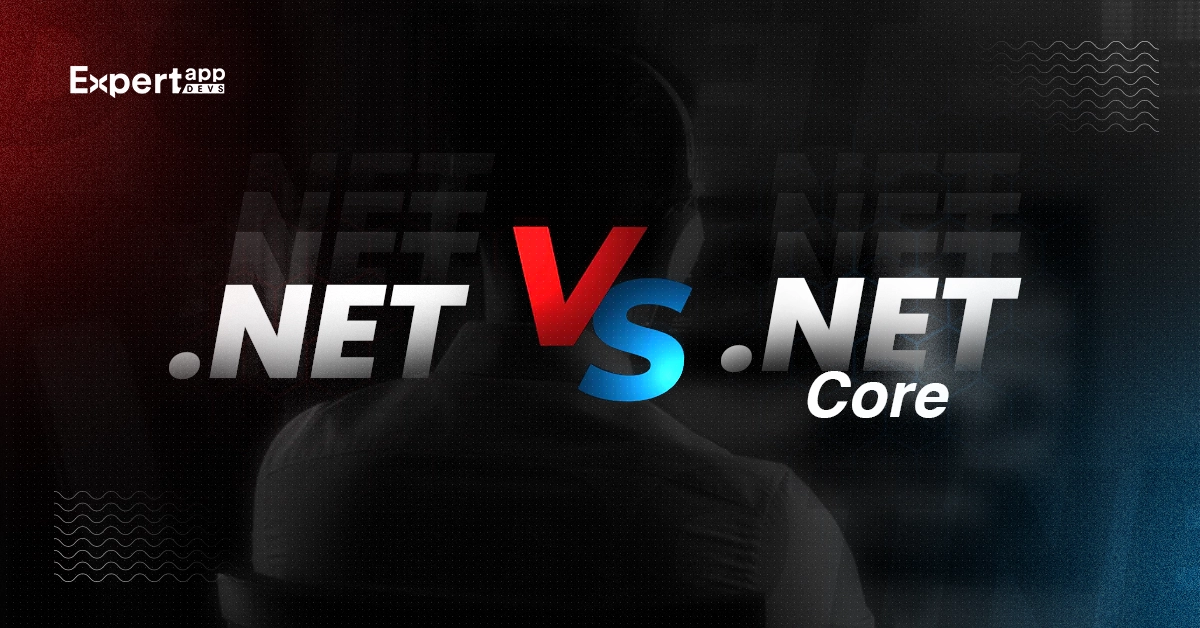.NET Framework vs .Net Core Comparison Decoded
What is the first thing you must consider while starting a web development project?
Choosing the proper web development framework for your project is fundamental.
Dot Net or .NET is one of the most preferred web development frameworks for building dynamic, scalable, and tailor-made web applications.
A report suggests that Dot Net is preferred by more than 18% of developers worldwide as their go-to framework for building scalable and dynamic websites and web applications.
Nevertheless, .NET is one of the most prolific and dynamic web application development frameworks.
However, the situation has changed a bit. Developers who want to use the .NET framework have to face the dilemma now as there are two options to select from.
- .NET Framework
- .NET Core
What to discuss about .NET framework vs .Net Core? What are the main differences? Which platform is the best one to develop highly versatile and scalable web apps?
We will answer all these questions in this post.
Let's start with the basics first.
What is .NET?

.NET is a trendy web development platform with various tools, programming languages, and libraries in Visual Studio.
It is a free, open-source, and cross-platform development platform that can develop a wide range of web applications such as websites, mobile applications, desktop applications, games, IoT apps, and many more.
You can write .NET applications in various languages, such as C#, F#, or Visual Basic. The best thing about .NET is that your code can run on any compatible operating system. Also, a standard set of class libraries and APIs can be used for .net application development.
You can have a .NET-powered applications with endless functionalities thanks to a .NET package ecosystem with more than 100,000 packages.
Advantages of .NET Framework
Let's check out some benefits of the .NET framework:
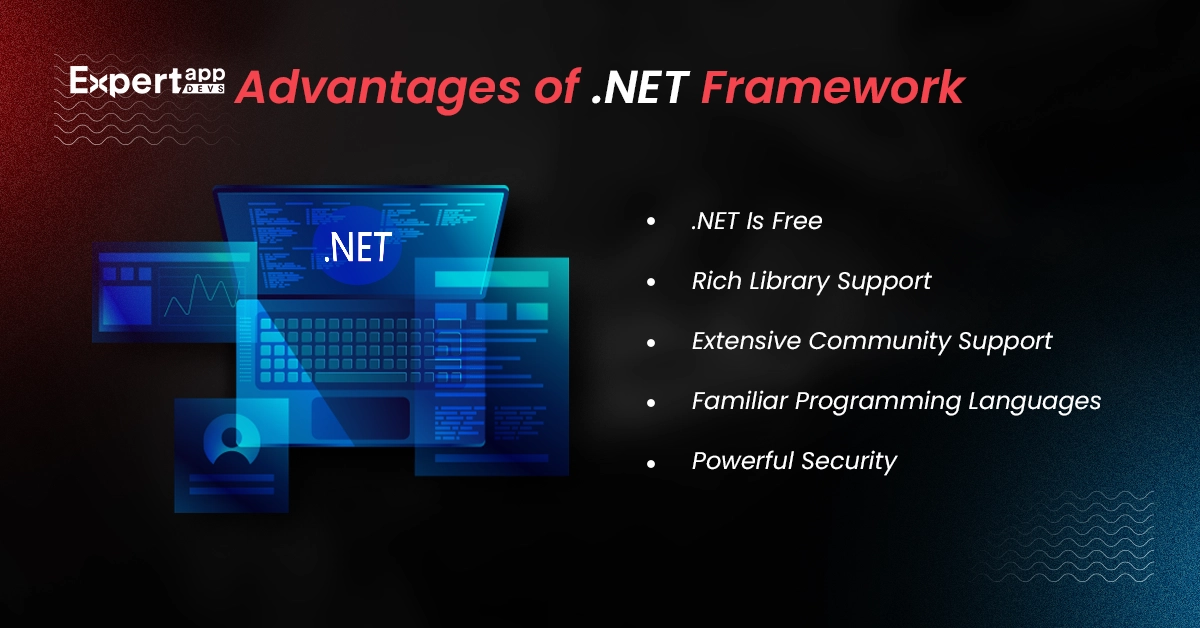
1. .NET Is Free
.NET is a free and open-source web development platform. It simply means that you don't have to pay to use it. Just download it and start using it. If you are a startup or have any budget constraints, it can help reduce costs to a great extent.
2. Rich Library Support
Libraries help developers to build high-end features and functionalities for apps. .NET framework has a massive library with pre-built components and APIs to help developers build versatile and dynamic web apps.
3. Extensive Community Support
Furthermore, the online .NET community is so large and active that you can contact it anytime. There are ready-made documents, videos, tutorials, and other resources to build scalable applications.
4. Familiar Programming Languages
Another reason to choose the .NET framework is it supports all familiar programming languages, such as C#, Visual Basic, and F#. For developers, starting the project is like smooth sailing.
5. Powerful Security
.NET has excellent built-in security features to mitigate cyber risks and attacks, such as cross-site scripting, SQL Injection, and others.
What is .NET Core?
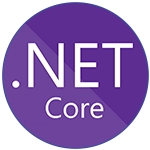
.NET Core is the latest addition or version of Microsoft's .NET framework. It is a free, open-source, and general-purpose web development platform that works on almost all operating systems, such as Windows, Mac, OS X, and Linux.
Microsoft developers built the .NET Core from scratch to make it lightweight, fast, modular, and superior to other platforms.
With .NET Core, you can develop high-end applications for mobiles and desktops. Also, you can build cloud apps, IoT apps, machine learning, microservices, and gaming apps.
Microsoft released the latest .NET Core version on March 3, 2022, called .NET Core 3.0.0. The cross-platform compatibility makes asp.NET Core one of the most preferred web development platforms for building highly scalable, versatile, and dynamic applications.
Benefits of .NET Core
Let's check out some benefits of the .NET Core:
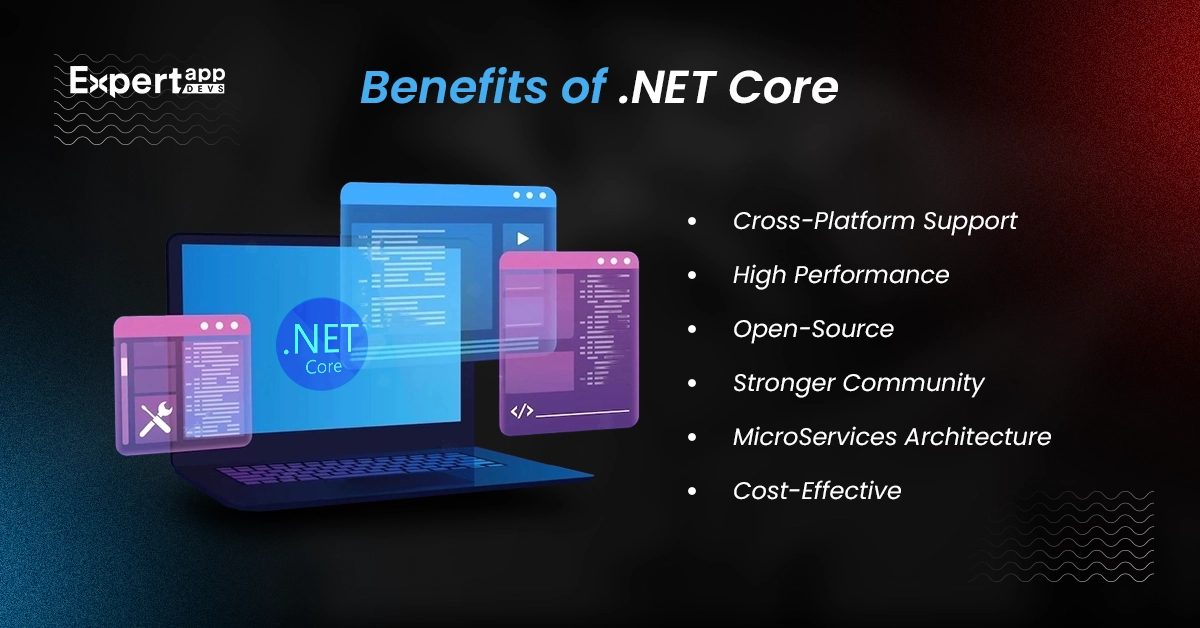
1. Cross-Platform Support
.NET Core supports almost all operating systems, such as Windows, Linux, and MacOS. This cross-platform compatibility makes it the most preferred web development platform.
2. High Performance
The main aim behind developing .NET Core was performance optimization, and this platform perfectly serves the core purpose. Also, it uses the Just In Time (JIT) compiler to improve the performance of web applications.
3. Open-Source
Like .NET Framework, .NET Core is also an open-source platform that is free to be used by anyone.
4. Stronger Community
The platform has a large community of developers contributing to its growth. You can use videos, tutorials, and online documents to develop scalable web applications.
Furthermore, developers can also use third-party APIs, libraries, and packages for web development.
5. MicroServices Architecture
If you want to use Microservices architecture for app development, .NET Core is the best option. It allows developers to break down the app into small, independent services. These microservices can then be built and deployed separately.
6. Cost-Effective
Being a cross-platform app development platform, .NET Core is very cost-effective. You can use the same codebase to develop apps for various operating systems and platforms.
Critical Differences In .NET Framework vs .Net Core
Now we have discussed both .NET framework and Net Core, let's discuss the significant differences between these platforms.
1. Compatibility
.NET Framework only supports Windows as it does not offer cross-platform compatibility.
On the other hand, .NET Core supports Windows, Linux, and MacOS. If you want to build a modern web application that can run on various operating systems, .NET Core is the better option.
2. Performance
As discussed earlier, .NET Core was conceptualized for better speed and performance. .NET Core defeats .NET Framework in the performance aspect.
Furthermore, .NET Core's JIT feature makes it quicker than .NET Framework. To build high-speed web applications, you should go for .NET Core.
3. Development and Deployment
.NET Core has Docker, a tool that helps in the containerization process. That makes the development of web applications with .NET Core quick and easy.
Also, various features such as cross-platform compatibility and support for modern development tools make .NET Core easy to develop and deploy.
On the other hand, .NET Framework is less flexible regarding the development and deployment of web applications.
4. Support for Microservices
.NET Core supports Microservices architecture that allows developers to minimalize the app into multiple small independent components that can be deployed later.
.NET Framework does not support Microservices. Developers cannot create various small services.
5. CLI Tools
.NET Core supports lightweight CLI tools for Windows, Linux, and MacOS platforms. Also, the platform allows developers to switch to an IDE for quicker development.
On the other hand, .NET Framework is too heavy for Command Line Interface. However, some developers still prefer CLI to IDE for web development.
6. Support for WCF/REST Services
When using .NET Core, you must create a REST API. It does not support WCF.
.NET Framework supports WCF as well as REST APIs.
7. Installation
When developers download and install .NET Core, applications are executed by Runtime. Then, .NET Core SDK is downloaded and installed for app development.
In .NET Framework, there is no availability of Runtime and SDKs.
8. Deployment Model
When comparing .NET vs. Dot Net Core for the deployment model, .NET Core wins. It allows developers to start system updates without disrupting the application.
On the other hand, developers must first deploy the .NET application to an internet data server. It is more rigid and not flexible enough, like .Net Core, when it comes to deployment.
9. Security
.NET Core is much more secure and safe compared to .NET Framework. It has all the modern security features and patches to ensure application safety.
.NET Framework depends on Windows and Code Access Security functions regarding the application's security. If security is your concern, you should opt for .NET Core. For example, if you are developing a finance or banking app or other apps involving sensitive data sharing, go for .NET Core.
10. Mobile App Development
This is important to consider when choosing a web app development platform. Regarding mobile app development, .NET Core allows developers to use Xamarin for code writing.
Developers can write code in C# for cross-platform applications. Also, .NET Core has shared codebases and APIs for mobile app development.
On the other hand, .NET Framework fails to integrate with other helpful tools for mobile app development. Developers have limited options for mobile app development with .NET Framework.
In short, .NET Framework is Windows-only, while .NET works on multiple operating systems.
Porting from .NET to .NET Core
You can enjoy many benefits of .NET Core if you port your existing .NET application to .NET Core. You must hire a dot net core developer with the right experience for the porting process.
Reasons to port from .NET to .NET Core:
- You can have better scalability and performance
- .NET Core has superior security measures and adheres to security compliances
- You can enjoy advanced features and functionalities
- You can have a future-ready application
- In-built dependency injections
- You can develop applications for the cloud, IoT, Machine Learning, etc.
Challenges you will face:
- If your existing app has some features that .NET Core does not support, you must work on that.
- You must also make code changes to port your app from .NET to .NET Core.
- You must hire a dot net core developer with a proven track record in the migration process.
When to migrate from .NET to .NET Core?
Many applications run on .NET Framework excellently. Why should you go for .NET Core, then? Which are the special considerations for which migration makes sense? Let's find out:
1. When you are looking for performance improvements
.NET Core has a modular structure that allows developers to access specific features and functionalities. It will significantly improve the app's performance, as developers need to implement the features they need. If you want to improve the app's performance, go for .NET Core.
2. When you want to target multiple platforms
.NET Framework is just for Windows. On the other hand, .NET Core allows you to target other platforms such as MacOS, Linux, etc. If you are looking for cross-platform compatibility, go for .NET Core.
3. When you want to get an open-source code
When you have open-source code, anyone can contribute to fixing bugs and address issues. What happens when you find an issue? Hiring a professional can quickly resolve the problem. .NET Core is an open-source platform that makes application maintenance easy and manageable.
4. When you want simple package management
NuGet is excellent, but sometimes, it might become problematic as many packages depend on other packages. It might not work in your favor. .NET Core has a new package manager that makes package management easy for developers.
Net Core vs NET Framework – Which One to Choose?
We have discussed almost everything about .NET vs. Dot Net Core. However, the million-dollar question remains: which one to choose for your business?
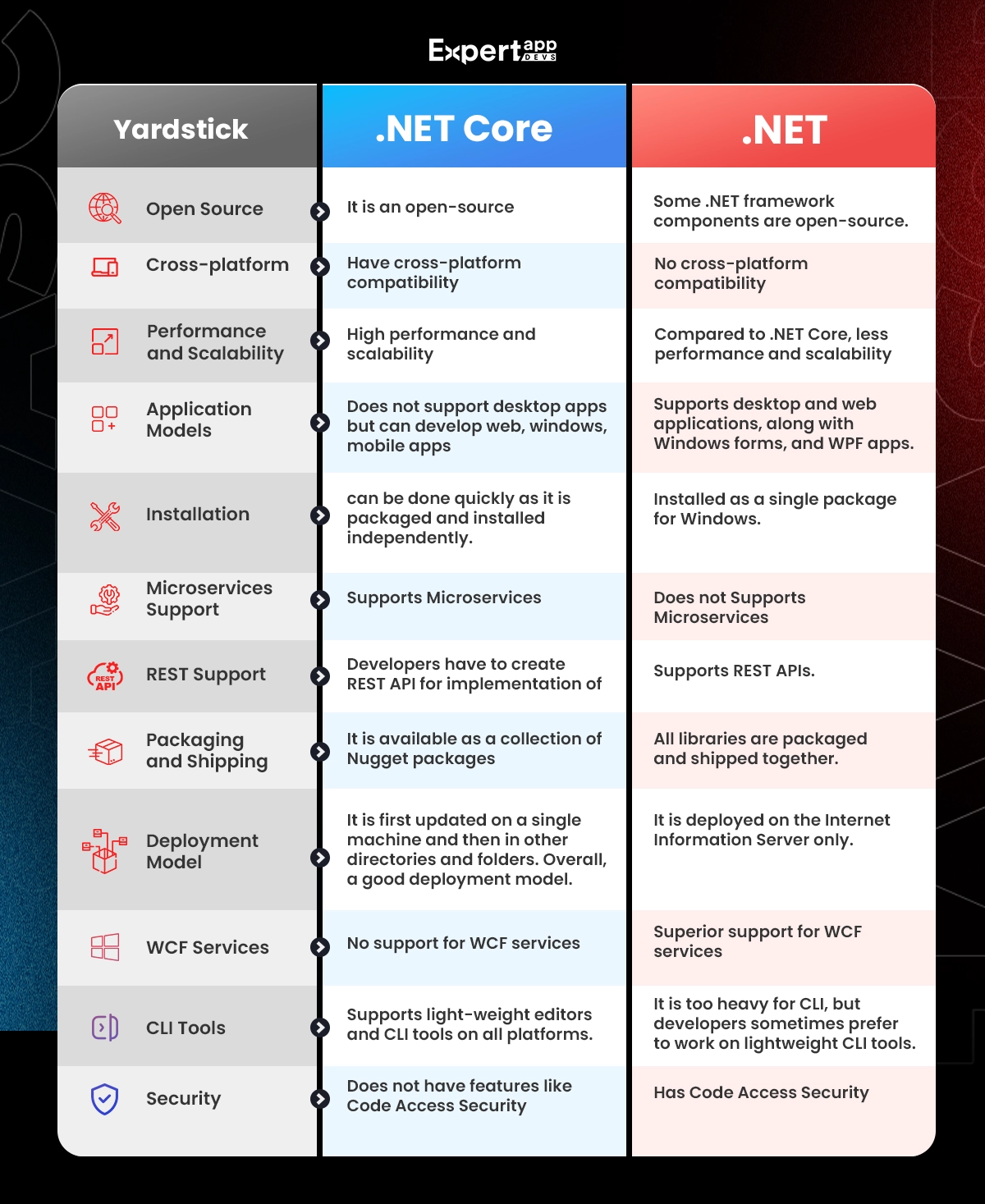
The answer is simple: it depends on the project requirements and scalability goals you have in mind. Here is a list of things you need to keep in mind while choosing the platform for your project:
When you need to choose .NET Core:
- When you want to develop your app with microservices for better project management.
- When you want to go for cross-platform.
- When your project relies on CLI. .NET Core supports CLI.
- When you want to build a project from scratch.
- When you are looking for high performance and scalability.
When you need to choose .NET Framework:
- When you don't want cross-platform compatibility.
- When you have an app that was running previously on the .NET framework.
- When you are looking for functionalities that .NET Core does not offer, such as Windows Forms, WPF applications, WCF services, ASP.NET web forms, and others.
- When you want a stable environment to run your app.
- When you want to avoid dealing with regular upgrades and changes.
What is the future of .NET and .NET Core?
Though the debate of .NET Vs. Dot Net Care is endless, and the future of both these frameworks is promising. These solutions have unique characteristics and requirements, which are preferred in various IT projects.
The selection of the proper framework will depend on your project requirements, scalability goals, and other requirements.
The best thing about .NET and .NET Core is that Microsoft powers them. So you can expect regular updates and upgrades for both these solutions to enhance performance and improvements.
Conclusion
So we have discussed almost everything about these promising technologies- .NET framework vs .Net Core.
Both these technologies have their benefits and limitations. Dot Net Framework is a mature framework that also has extensive library support.
On the other hand, .NET Core is an open-source, cross-platform development platform that allows you to target audiences from other operating systems.
Choosing the right platform depends on development goals, scalability goals, and other crucial parameters. You must discuss things with various stakeholders before making the right decision.
As a Next-Gen ASP.NET development company, Expert App Devs has expertise in .NET and Dot Net Core. Hire .net or dot net core developer to streamline processes and deliver well-tested cross-platform applications according to your right decision. Hire .NET developers starting at $22/hour or $2500/month. Start your 5 days trial now!
 Jignen Pandya
Jignen Pandya
